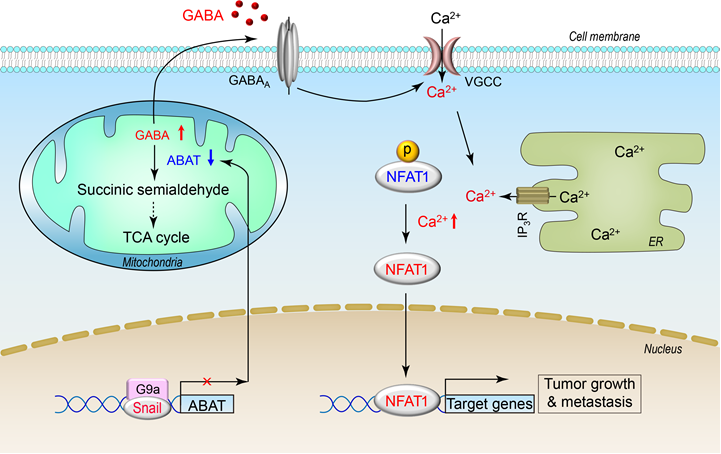With the support by the National Foundation of Natural Science of China, National Foundation of Natural Science of Zhejiang Province, and the national key research and development plan, a study by the research groups led by Prof.Chenfang Dong (董辰方) from Zhejiang University School of Medicine demonstrates that Loss of ABAT-Mediated GABAergic System Promotes Basal-Like Breast Cancer Progression by Activating Ca2+-NFAT1 Axis, which was published in Theranostics (2019; 9(1):34-47). Ph.D. students Xingyu Chen, Qianhua Cao, Ruocen Liao and Xuebiao Wu share the co-first authorship.
Basal-like breast cancer (BLBC) is associated with an aggressive clinical history, early recurrence, distant metastasis and shorter survival. Because of its highly aggressiveness and lack of effective therapeutics, elucidating the molecular mechanisms leading to the fatal aggressiveness and identifying relevant molecular indicators and targets in BLBC is urgently needed. Gamma-aminobutyric acid (GABA) is a major inhibitory neurotransmitter in the mammalian central nervous system. Gamma-aminobutyrate aminotransferase (ABAT), a key enzyme responsible for catabolism of GABA, catalyzes the transfer of the amino group of GABA to α-ketoglutarate, producing succinic semialdehyde and L-glutamate. Prof.Dong’s group examined over 5,000 breast cancer patient samples and found that levels of the metabolic enzyme ABAT were dramatically decreased in patients with basal-like breast cancer. Further studies found that ABAT expression is downregulated due to Snail-mediated repression, leading to increased GABA production. GABA then elevates intracellular Ca2+ concentration through activation of GABA-A receptor (GABAA), which contributes to efficient activation of NFAT1 in BLBC cells. ABAT expression results in the inhibition of tumorigenicity and metastasis of BLBC cells in vitro and in vivo. These findings suggest that loss of ABAT-mediated GABAergic system represents an oncogenic event responsible for the aggressive behaviors of BLBC, providing potential prognostic indicators and therapeutic targets for this challenging disease.

Figure: A proposed model to illustrate that loss of ABAT by Snail-mediated repression activates GABAergic system in BLBC